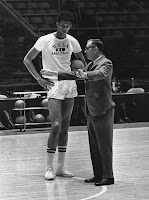I have 2 versions of this form. One for Windows 2007 and one for Windows 97-2003. When you go to these links, it will probably look crazy. I tested it and it still works. Once you download and save the file, it will look like the example below.
Some things you need to know about using this form:
- In the “Start Time” cell, you can enter the time either HH:MM or H:MM. You do not have to use military time, nor do you have to add AM or PM.
- Once you enter the Start Time, you will not have to edit the “Time” column down the left side of the form.
- Under the “Clock Set” column, you will need to enter the time H:MM. In other words, a 5 minute drill will be entered in that column as “0:05”. Once you have entered the Clock Set, the “Time” in the next row should automatically update.
- You are able to enter multiple lines of text in an individual cell under the “Drill” column. To do this, you need to hit the alt button and the enter button at the same time (This is the struggle for Coach Samples I mentioned earlier). In the example below, the first drill would be typed like this: “Individual Work (2 @ 7:30)” [alt+enter] ”-Ball Handling (JS)” [alt+enter] ”-Shooting (MG)”
- Once you enter the text, you can tab out of the cell and it will automatically adjust the height of the row.
- You may have rows that are not used at the bottom. The Time column will still print “#NAME?”. You can highlight the rows, right click on them, and click “Delete” to get rid of those rows.
- You cannot insert rows. The time function will not work if you insert rows. You can cut and paste.
- You cannot have blank cells in between Clock Set times.
If you have problems with this form, please feel free to contact me. I will do my best to provide some customer service (notice I didn’t say technical service, but I can get answers for you).








